Resident & Neighborhood Survey Highlights
As part of the ongoing effort to engage residents in the Westside Evolves planning process and to ensure that community needs, preferences, and priorities remain central to the process, the Chattanooga Housing Authority, Chattanooga Design Studio, and the City of Chattanooga conducted Resident and Neighborhood Surveys in October and November 2020.
A 59-question Resident Survey was conducted at the two target housing sites — College Hill and Gateway Tower. A total of 449 residents completed the survey for an 82% response rate. A shorter Neighborhood Survey was completed by 257 respondents including 241 Westside residents. In total, the two surveys reached 690 Westside residents, approximately 46% of the 1,514 households that live in the neighborhood. Thank you to all who participated!
Although ~57% residents reported their health as good or excellent, residents report chronic health conditions, including poor psychological well-being and poor oral health, at much higher rates than the City of Chattanooga.
* ~86% of residents rate their health care services as Good or Excellent.
* Approximately half (~47%) of residents go to a hospital or urgent care
center most often when they are sick or in need of health advice.
* Dental services are the greatest unmet health need (40%).
Overall, College Hill (~64%) and Westside (~67%) residents are more likely to report unmet health needs than residents at Gateway Tower (~44%).
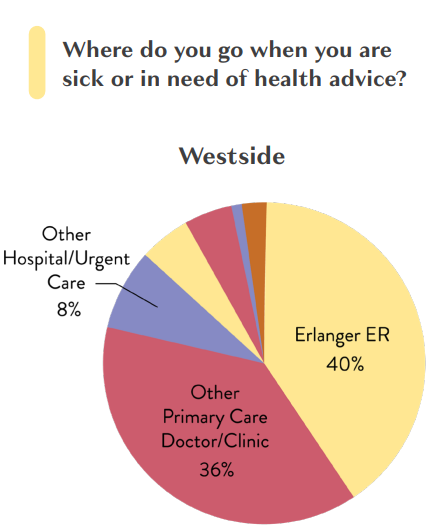
* College Hill residents who are disabled are more likely to need psychological health services (~32%) or services related to accessibility (~22%).
* Gateway Tower residents who are disabled are more likely to need assistance with activities of daily living: in-home health assistance (~49%) and homemaker services (~63%).
* Residents noted that impairments (~27%) and health conditions (~18%) limit them from being more physically active.
* Emergency food assistance is the #1 unmet need.
* Residents travel far afield to grocery shop (~61% at Food City) which is particularly challenging for those reliant on public transit.
* Cost (~19%) and availability of fruits and vegetables (~10%) are cited as impediments to healthier eating.
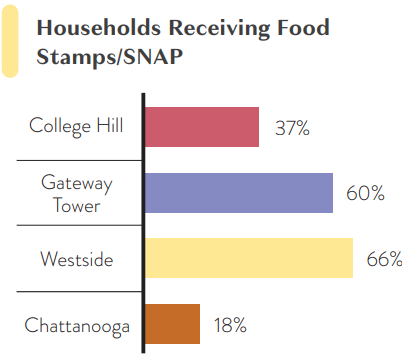
If relocation is deemed necessary for redevelopment, most residents need more information before stating a preference for temporary housing.
* However, College Hill Residents prefer moving with Section 8 (~40%) and Gateway Towers residents prefer to move directly into a replacement unit in the neighborhood (~31%).
* Approximately 2 out of 3 residents indicated that, if temporarily relocated, they would like to return to the redeveloped site.
* Residents would most like to see a Picnic/Barbecue area (~54%).
* College Hill residents also prioritized a Playground/Tot lot (~43%).
* Gateway Towers residents preferred a Swimming Pool (~49%).
* Westside residents favored a Community Garden (~27%).
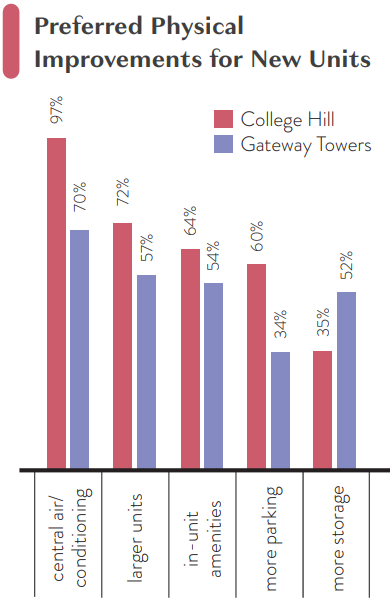
Approximately half (~47%) of College Hill/Westside children age 0-5 years attend a center-based early learning program, including the Head Start program offered by YFD in the neighborhood.
A little more than 1/3 of College Hill/Westside students (~37%) currently participate in an after-school program. Most common obstacles to participation are the following:
- Concerns about safety due to the Covid-19 pandemic (~45%)
- Hours/schedule (~21%)
- Don’t know what programs are available (~21%)
Interest in future participation in several program areas including Sports and recreation (~51%), After school programs (~46%), Arts/Performing Arts/Music (~40%), Summer programs (~33%), and Tutoring/academic support (~31%).
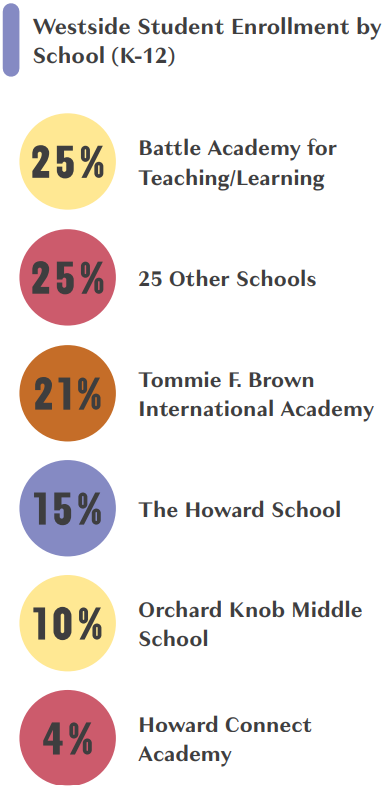
* Word of mouth is by far the most frequent way that residents get information about what is going on in the Westside neighborhood (75%).
* However, half of residents also rely on CHA staff, meetings, newsletters or fliers.
Many College Hill residents with children perceive walking to and from school/bus or riding the school bus as unsafe; 1 in 3 are very unlikely to allow child to play outside in the neighborhood.
* Residents feel least safe in the neighborhood at night, in the walkways between buildings and walking under US 27 (~38% feel somewhat to very unsafe).
* Gateway Tower residents view police in more positive light ( 72%) than College Hill (~93%) and Westside residents (~86%).
* College Hill residents are more likely to have experienced crime (~41%) than Gateway Tower residents (~16%).
* But Gateway Tower residents were more likely to believe crime occurs frequently in the neighborhood (1-2 times per week) (~48%) than College Hill residents (31%).
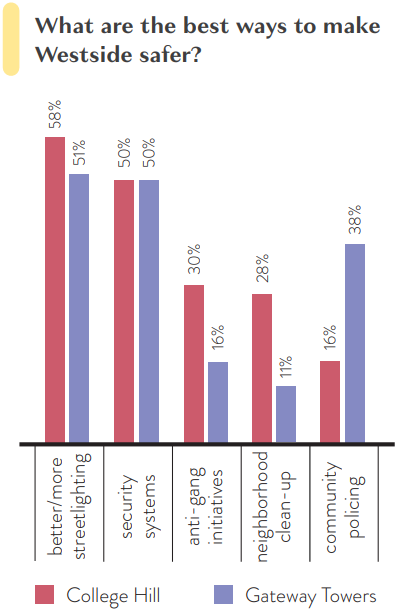
* Disablement and related issues such as caring for a disabled family member (~45%)
* Covid-19 pandemic (~22%)
* Affordable childcare/day care (~16%)
* Transportation (13%)
* Half of residents do not have reliable Internet access at home (~52%).
* Approximately half of College Hill and Gateway Tower residents most often access the Internet via their smart phone (~50% and 41% respectively).
* Only 1 in 5 at College Hill and Gateway Tower use a home computer often.
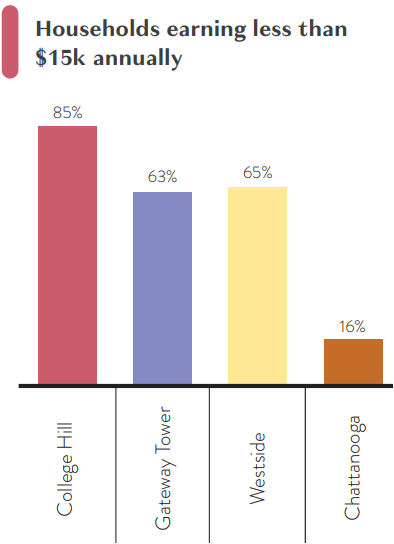
* Many residents highly valued access to CARTA, as ~39% of residents rely on public transit as their primary mode of transportation.
* Approximately, 1 in 4 College Hill and Gateway Tower residents reported that transportation is an obstacle when trying to get where they need to go.







